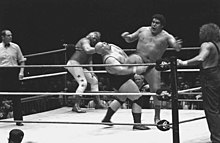King Kong Bundy
| Christopher Pallies | |
|---|---|
| Data | |
| Ring name |
King Kong Bundy Chris Canyon Big Daddy Bundy Boom Boom Bundy Man Mountain Cannon, Jr. |
| height | 193 cm |
| Fighting weight | 212 kg |
| birth |
November 7, 1957 Atlantic City , New Jersey |
| death | 4th March 2019 |
| Trained by | Larry Sharpe |
| debut | 1981 |
Christopher Pallies (born November 7, 1957 in Atlantic City , New Jersey , † March 4, 2019 ), better known under the name King Kong Bundy , was an American professional wrestler . Due to his stature, he has also made a few appearances in television series and films.
Career
Pallies began his wrestling career in 1981 at the regional level and was trained by Larry Sharpe, the later owner of the training center "Monster Factory". 1981 Pallies worked under the name Chris Cannon and Man Mountain Cannon Jr. as a jobber for the first time for the World Wrestling Federation . In 1982 he went to Dallas and wrestled for World Class Championship Wrestling , Fritz von Erich's league . Initially called Big Daddy Bundy as a crowd favorite, he was finally renamed King Kong Bundy and made a villain out of him. Pallies feuded in the WCCW with the von Erich family and often teamed with "Wild" Bill Irwin. In 1982 he received the WCCW American Heavyweight title there , which he lost to Fritz von Erich in his last match in the same year.
In the following years Pallies appeared in various territories of the National Wrestling Alliance , including for Georgia Championship Wrestling and the Universal Wrestling Federation , where he feuded mainly with the Road Warriors . During this time, his gimmick was developed, not to let the pin fall count to 3, but to 5 as usual.
In 1985, Pallies came back to WWF and was built up as a monster villain. He was initially assigned Jimmy Hart as manager and let him defeat some jobbers in very one-sided and short matches. Even in the first Wrestlemania , he defeated his opponent SD Jones in just 23 seconds (officially 9). Pallies also made his first appearances in Japan in 1985 for New Japan Pro Wrestling . In the following, he was given Big John Studd as a partner, and Bobby Heenan as a manager and let them feud against André the Giant and Hulk Hogan . This led to the storyline that led to the cage match at Wrestlemania II in April 1986 , which Pallies lost to Hogan.
The team with Studd was maintained for a while and included in the storyline about the suspension of André the Giants and his return as part of the group "The Machines". After that, Bundy denied more trivial feuds, such as B. against Jake Roberts , Blackjack Mulligan or Hillbilly Jim, whom he met at Wrestlemania III in a special match with midget wrestlers.
Towards the end of 1987, Pallies and André the Giant were able to contest main events against Hulk Hogan and various partners, including the first Survivor Series . In early 1988, Pallies then left the WWF and turned to other projects.
In 1994 he finally made a comeback for the WWF as part of the Stables Million Dollar Corporation and began a feud with Undertaker that ended with his win at Wrestlemania XI. At the end of 1995 he left the WWF again.
Since then, Pallies has performed on an independent level.

useful information
His battle name inspired the family name Bundy from A Terribly Nice Family , in which he also appeared as a guest star in two episodes: In the episode The Terrible Relatives he played Peggy's brother Irwin, in the episode Bud himself in the ring .
Filmography (selection)
- 1988; 1995: A Terribly Nice Family ( Married… with Children , TV series, two episodes)
- 1988: Moving - Backward into Chaos (Moving)
- 2002: Bill's Seat (short film)
- 2008: Fight the Panda Syndicate
title
American Wrestling Association
National Wrestling Alliance
- 1 × NWA New York Heavyweight Champion
- 1 × NWA National Tag Team Champion (with The Masked Superstar )
World Class Championship Wrestling
- 2 × WCCW American Heavyweight Champion
- 2 × WCCW American Tag Team Champion (once with Bugsy McGraw , the second time with Bill Irwin )
Web links
- King Kong Bundy in the Internet Movie Database (English)
- WWE alumni profile of King Kong Bundy
- Interview with King Kong Bundy on Slam! Sports
- Obsessed With Wrestling: King Kong Bundy (en)
- Profile on Neckbruch.com
supporting documents
- ↑ King Kong Bundy . In: WWE . ( wwe.com [accessed January 1, 2018]).
- ↑ WWE Legend King Kong Bundy Passes Away. March 19, 2019, accessed June 24, 2020 .
- ↑ Slam! Sports: Interview with King Kong Bundy
| personal data | |
|---|---|
| SURNAME | King Kong Bundy |
| ALTERNATIVE NAMES | Pallies, Christopher (real name) |
| BRIEF DESCRIPTION | American wrestler |
| DATE OF BIRTH | November 7, 1957 |
| PLACE OF BIRTH | Atlantic City , New Jersey |
| DATE OF DEATH | 4th March 2019 |
